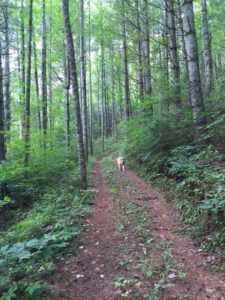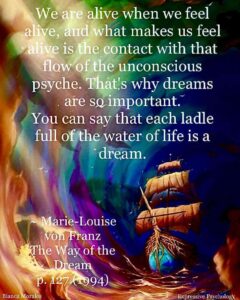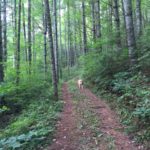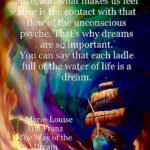
Long ago when Earth was young and the collective ego in its infancy, the idea of uprooting oneself from the safety of home and hearth and taking a solitary journey into unknown territory had sacred significance. Even the most powerful rulers feared the unknown so much that they would not make any important move without first consulting divine guidance. Thus it was that in ancient Greece crossroads acquired sacred meaning, and divine help from Hecate, Goddess of the crossroads, was invoked at places where three roads met. Images of Hecate Trevia, (Hecate of the Three Ways) guarded three-way crossroads for many centuries.
Barbara Walker tells us that besides presiding at crossroads, Hecate was also the guardian of gates — especially the gate of birth. Under the name of Enodia, a name shared by Hecate, Artemis, and Persephone, the underworld Goddess also ruled the gates of death and was the original holder of the key to Hades. In the 8th century BCE in Italy, Vanth was the Etruscan winged goddess of the netherworld. With snakes wrapped around her arms, she carried keys and either a torch or a scroll inscribed with her name. In the Yoruba culture of Africa, Elegba the Divine Messenger is still consulted for divination. Luisah Teish says she is “the Master of the Crossroads, the Gatekeeper who stands between the Material and the Spiritual, the Visible and the Invisible, between Existence and Oblivion.”
These are all manifestations of the Wisewoman archetype, the aspect of the sacred feminine which enables us to explore the inner depths without losing our way. Her symbols describe her attributes. Keys represent access to secret realms, full power and authority within these realms, and the condition of being initiated. Her snakes protect sacred precincts, including the underworld. A torch is a common symbol of purification and enlightenment in rites of initiation. A scroll, as the original form of the book, is a symbol of learning, enlightenment, communication, and sacred writings. One other symbol associated with the Wisewoman is the veil, which suggests hidden or esoteric knowledge.
The “counselor at the crossroads” aspect of the Wisewoman represents our instinctive recognition of opportunities for choice at critical stages of life and the knack for making appropriate decisions based on love and the true processes of our souls. As “weaver at the gate” she represents our ability to stand between pairs of opposites, heeding the truths of both and holding the tension of indecision while weaving the separate and apparently incompatible threads of warp and woof into new patterns until they merge into an original, unified piece.
Some gates offer opportunities for choice — as when we learn we have a fatal illness and can choose how to treat it and how to approach our deaths — and some do not. For example, we do not get to choose when we are born or what family we are born into. But we can still reflect on the meaning of every passage, whether it is chosen or not, and we can choose how we will respond to what we cannot change.
Two things protect us on the journey into the unconscious: the ability to trust our inner guidance when we reach a potentially dangerous crossroads, and the patience to wait at the gate until the healing solution comes. If we can do this, the Wisewoman, our inner priestess and healer, will direct our path to wholeness and spiritual growth. May you be fortunate enough to meet her at the crossroads and gates of your own journey.
You can find Healing the Sacred Divide at Amazon and Larson Publications, Inc.

A Lesson on Aging
I’m so happy to be back in the mountains. I love the weather, the trees, the birds, the rushing creek, the flowering bushes. The beauty.





0 Responses
Hi Jeanie,
I enjoyed reading your Wisewoman blog so much I printed a copy for future reference. In reference to you ‘choice’ comments, there is a body of knowledge of an esoteric/metaphysical nature that maintains we do choose our parents and life situations for growth opportunities and experiencing!
Just a thought…bett
Hi Bett,
Thanks so much for letting me know of your appreciation for this post. It means a lot.
I’ve read about the theory that our souls choose our parents and life experiences. I like it and am very open to it. (Isn’t Dr. Brian Weiss one of its proponents?) It certainly helps explain the subjective realities of many people.
I haven’t pursued it in depth because I limit my research and writing to topics which I either know a lot about from personal experience or which help me make sense of my life. In that regard, Jung’s theories resonate in a big way for me, although I’m not attracted to everything he says.
I take the position that in esoteric/metaphysical matters, no one can objectively know which theories are “right” and which are “wrong”: religious, psychological, philosophical or otherwise. All we can do is pursue ideas to which we are drawn and which help us make sense out of our lives while remainomg open to ideas that do the same for others. I sense you feel the same way.
I very much appreciate your very apt and well-informed comments. You always give me lots to think and write about!!
Much love,
Jeanie
Dear Jean,
I found this piece very moving and apt, as I passed through one of these gates today (in the appropriately patient way, I believe).
Best regards, Skip
Thank you, Skip. I’m glad this spoke to you. I hope the outcome of your passage benefits you and all you know.
Jeanie